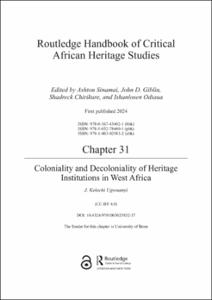Ugwuanyi, Kelechi: Coloniality and Decoloniality of Heritage Institutions in West Africa. In: Routledge Handbook of Critical African Heritage Studies. London: Taylor & Francis, 2024. 427-441.
Online-Ausgabe in bonndoc: https://hdl.handle.net/20.500.11811/12594
Online-Ausgabe in bonndoc: https://hdl.handle.net/20.500.11811/12594
@inbook{handle:20.500.11811/12594,
author = {{Kelechi Ugwuanyi}},
title = {Coloniality and Decoloniality of Heritage Institutions in West Africa},
publisher = {Taylor & Francis},
year = 2024,
month = sep,
booktitle = {Routledge Handbook of Critical African Heritage Studies},
pages = 427--441,
note = {Every institution has a mandate, and every mandate has a purpose. For a heritage institution, the mandate is to ‘manage’ heritage. In the case of the nations created in Africa by the imperial powers, the purpose is to legitimise the modern states by establishing a national narrative and identity to help colonial and post-independent African leaders maintain relations established by the colony. This chapter draws from the decolonial analytical tools of ‘coloniality of power’, ‘coloniality of knowledge’, and ‘coloniality of being’ using instances from Nigeria to discuss the areas of concern for the decoloniality of heritage institutions in West Africa. Applying the coloniality of power, this chapter examines how heritage institutions are implicated in constructing current global geocultural and social identities through a racially hierarchised, Western-centric, asymmetrical, and modern power structure. This chapter interrogates how the institutions support the coloniality of knowledge by helping to determine who produces which knowledge, for whom, and for what purpose. The chapter further engages how heritage institutions contribute to the objectification of Africans – coloniality of being. It justifies how the coloniality of heritage has persisted because of the global asymmetry in heritage management.},
url = {https://hdl.handle.net/20.500.11811/12594}
}
author = {{Kelechi Ugwuanyi}},
title = {Coloniality and Decoloniality of Heritage Institutions in West Africa},
publisher = {Taylor & Francis},
year = 2024,
month = sep,
booktitle = {Routledge Handbook of Critical African Heritage Studies},
pages = 427--441,
note = {Every institution has a mandate, and every mandate has a purpose. For a heritage institution, the mandate is to ‘manage’ heritage. In the case of the nations created in Africa by the imperial powers, the purpose is to legitimise the modern states by establishing a national narrative and identity to help colonial and post-independent African leaders maintain relations established by the colony. This chapter draws from the decolonial analytical tools of ‘coloniality of power’, ‘coloniality of knowledge’, and ‘coloniality of being’ using instances from Nigeria to discuss the areas of concern for the decoloniality of heritage institutions in West Africa. Applying the coloniality of power, this chapter examines how heritage institutions are implicated in constructing current global geocultural and social identities through a racially hierarchised, Western-centric, asymmetrical, and modern power structure. This chapter interrogates how the institutions support the coloniality of knowledge by helping to determine who produces which knowledge, for whom, and for what purpose. The chapter further engages how heritage institutions contribute to the objectification of Africans – coloniality of being. It justifies how the coloniality of heritage has persisted because of the global asymmetry in heritage management.},
url = {https://hdl.handle.net/20.500.11811/12594}
}






